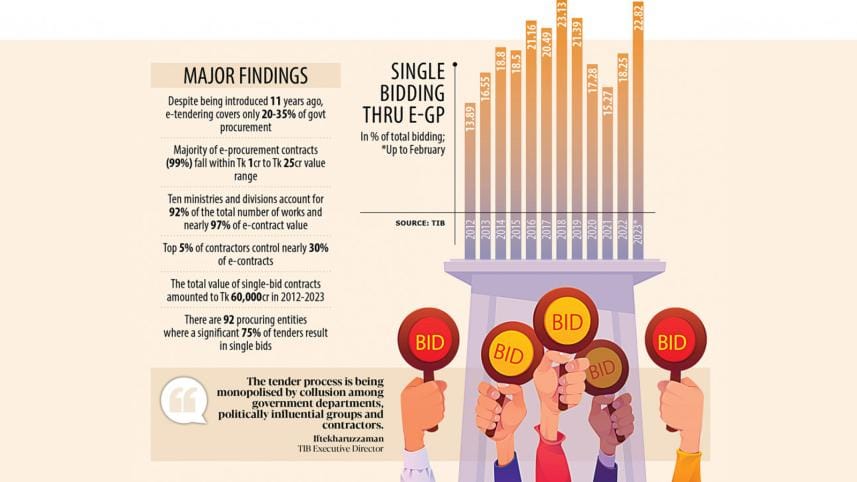Tk 60,000cr contracts awarded in 11 years based on single bids

The electronic procurement, rolled out more than a decade ago to ensure competition and cut the scope of irregularities, still suffers from a lack of competition as public agencies awarded contracts worth Tk 60,069 crore based on single bids, a new study found.
A single bidding scenario occurs when a contract is given out through a tender process with the participation of only one bidder in a competitive market.
One out of five contracts is awarded through a single bid via e-GP and contracts involving Tk 60,069 crore were given out in such a manner, which represents 15 percent of the total e-contract values, according to the study by the Transparency International Bangladesh (TIB).
For example, there are 92 procuring entities where 75 percent of tenders resulted in a single bidding and 416 contractors had a single-bidding ratio of at least 75 percent in the last 11 years.
"It often raises concerns about potential corruption in public procurement as corrupt practices are more likely to emerge and sustain when there is only one company participating in the bidding process," said TIB.
The TIB yesterday unveiled the findings of the study styled "Government e-procurement in Bangladesh: Monitoring the trend of competitive practices" at its office in Dhaka.
"Such a limited competition can hinder transparency and fairness in procurement, underscoring the importance of fostering a competitive environment to mitigate corruption risks."
The top 5 percent of contractors control nearly 30 percent of e-contracts and their dominance is on the rise, the study said.
"The tender process is being monopolised due to a collusion among government departments, politically influential groups and contractors," said TIB Executive Director Iftekharuzzaman at the event.
"This led to an extensive tripartite collusion. It is decided in advance who will be given the job."
Iftekharuzzaman said although e-GP was a positive initiative from the government and has saved money and time, the prime objective of ensuring competition has not been achieved.
"In the government procurement system, capturing markets has become institutionalised."
He added the TIB has exposed many procurement entities and government offices by presenting data and the Anti-Corruption Commission can work on it.
The study, which used the data from January 2012 to February 2023 on 64 ministries and divisions, was carried out by Mohammad Tauhidul Islam, coordinator for outreach and communication at the TIB, and Rifat Rahman and KM Rafiqul Alam, both researchers.
Since 2012, around 20 to 35 percent of government procurement has been covered through e-tendering. However, nearly all high-value contracts have not been covered by it, said Tauhidul, while presenting the findings.
The value of almost 99 percent of e-procurement contracts is less than Tk 25 crore.
E-procurement has seen an overall increase in the average number of bids, but the open tendering method (OTM) receives only 3.54 bids per tender, while the limited tendering method (LTM) attracts 47.75 bids, said the TIB.
"The 10 percent price cap in the OTM promotes LTM, which requires no prior experience and distorts potential for market competition."
District-wise, Feni and Noakhali accounted for half of all contracts awarded through the single bid process, while it was one-third for Cumilla and Narayanganj.
The Chattogram City Corporation topped the list with approximately 62.70 percent of contracts being awarded through the single bid procurement, followed by Dhaka South City Corporation at 55.21 percent.
The TIB recommended that all high-value contracts be expeditiously included in the e-tendering process.
The present practice of price caps in OTM and LTM should be abandoned to ensure transparency and optimal value for money, it said, calling for rigorous scrutiny for procuring entities with a high incidence of single bidding.
"All procuring entities as well as the Central Procurement Technical Unit should place high priority on adopting and enforcing specific procedural measures to enhance competition."
It said the opportunity created by e-GP to promote a transparent, accountable, fair, competitive, and corruption-free procurement system should be regularly monitored and upgraded by implementing data-driven analysis for decision-making.



 For all latest news, follow The Daily Star's Google News channel.
For all latest news, follow The Daily Star's Google News channel.
Comments